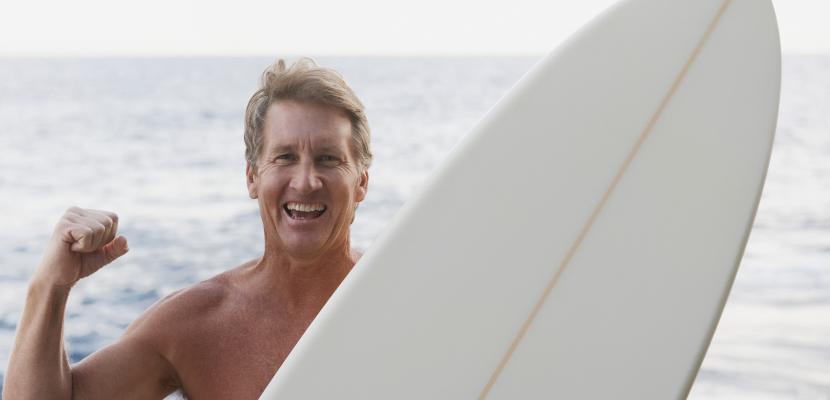
Grommets and young surfers may think they rule the waves, but a Bond University research study into recreational surfing and its impacts on bone health has shown that surfing may be the ideal physical activity for middle-aged aquatic enthusiasts.
Given the lack of research investigating bone health in middle aged surfers, the Bond University study set out to assess the bone mineral density and bone mineral content in mature aged male surfers aged over 60 and their age gender-matched sedentary counterparts.
Bond University’s Water Based Research Unit in the Faculty of Health Sciences and Medicine Associate Professor Mike Climstein and one of his Honours students Zachary Pollard conducted the research involving 21 participants.
“In Australia it is estimated that there are more than 2.7 million recreational surfers, with approximately one in 10 Australians participating in this aquatic activity and one third of non-surfers interested in learning to surf,” he said.
“The Gold Coast and South East Queensland is considered to be one of the Meccas for surfing with younger individuals right through to mature aged people 70 years and older actively participating.
“Bone health is an important factor in ageing and it is well recognised that weight-bearing physical activity can have a positive effect on bone health.”
Associate Professor Climstein said compressive force loading of the musculoskeletal system during ambulatory movements such as running and squatting exercise helps build bones and therefore results in an improved bone strength mass.
“Conversely, participating in non-weight bearing aquatic activities such as scuba diving and swimming has been shown to be detrimental to bone health,” he said.
“Surfing has been shown to be a low impact activity with very low ground reaction forces for the majority of the time.
“A time and motion analysis of recreational surfers reported that a 60 minute recreational surfing session involved 34 percent sitting, 55 percent slow to moderate paddling, eight percent fast paddling and only three percent wave riding.
“Therefore, the total stimulus of high ground reaction forces on bone is limited to only 1.8 minutes of a 60 minute session.”
The research undertaken involved participants in two groups – surfers with a minimum of 40 years surfing experience and age and gender-matched sedentary controls.
Associate Professor Climstein said the data collected included past/present physical activity questionnaires, biomarkers, bone mineral density, bone mineral content and segmental body composition (lean mass and fat mass via dual-energy X-ray absorptiomentry).
He said surfers had a significantly higher mean bone mineral density in the arms, trunk, ribs, spine and lumbar spine, essentially the upper body which is the most involved when surfing.
“The results of the research identified the beneficial effects of long-term participating in recreational surfing regarding bone health,” he said. “It is ideal for the middle-aged aquatic enthusiasts.”
ENDS